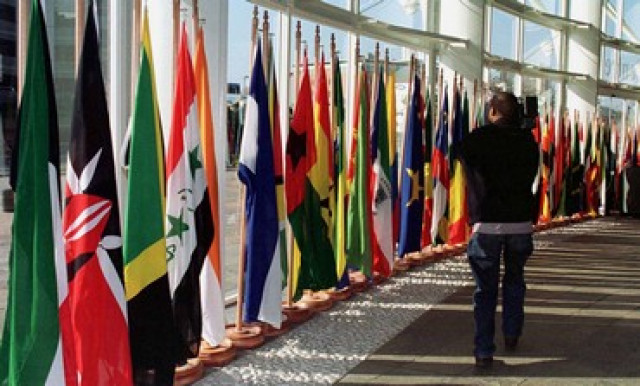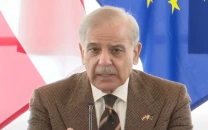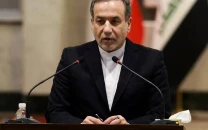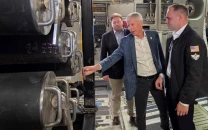Iran hails Non-Aligned summit as diplomatic coup against West
Iran hopes to earn diplomatic kudos over the coming week.

Iran hails Non-Aligned summit as diplomatic coup against West
The Islamic Republic's three-year tenure of the Non-Aligned Movement (NAM), which starts on Sunday, is a chance for Tehran to elevate its international standing as the United States seeks to cripple its economy and isolate it diplomatically over its nuclear programme.
Although many analysts say the movement, set up in 1961 to counter big power domination of international relations, has waned since the end of the Cold War, the diplomatic spotlight will give Tehran an opportunity to show Washington has failed to cut it off from the rest of the world.
"Hosting the conference is Iran's way of breaking the diplomatic embargo," said Vali Nasr, dean of the School of Advanced International Studies at Johns Hopkins University.
Around 35 heads of state or government are attending from the movement's wide membership that stretches from developing giants such as India to tiny Caribbean islands.
The guest list includes new Egyptian President Mohammad Mursi - the first Egyptian leader to visit Iran since its Islamic revolution in 1979.
United Nations Secretary General Ban Ki-moon will also attend, resisting diplomatic pressure to boycott the event After President Mahmoud Ahmadinejad repeated his view that Israel is a "cancerous tumour" that had no place in the Middle East.
Both are expected to attend an address by Iran's most powerful figure, Ayatollah Ali Khamenei.
"The Iranians love a stage. If they handle it diplomatically they will at least bask in the reflected glory," said Ali Ansari of St Andrews University in Scotland.
As host, Iran will prepare of the first draft of the meeting’s final declaration, likely to include statements affirming its right to peaceful nuclear technology, condemnation of Israeli military threats against it and censure of Israel’s occupation of Palestinian lands.
"Hosting and chairing NAM has a lot of benefits. It's the basis for continuing political influence over a significant group of developing nations for three years," said Professor Peter Willetts of City University.
"The host always has key influence over the starting point for discussions."
Where that may differ is on the issue of Syria, Iran's chief ally in the region in its "axis of resistance" against Israel, Sunni Arab states and their Western backers.
Dissent on Syria
Willetts' analysis of a UN General Assembly vote on Aug. 3 condemning the Syrian government's use of force against its own people showed that 70 of the 120 NAM members voted in favour and only 8 voted with Syria, Iran, China and Russia.
"Given NAM members have a long history of opposing interference the internal affairs of developing countries, this is an extraordinary demonstration of the revulsion felt by the majority towards the violence in Syria," he said.
"Iran will be very embarrassed in its domestic politics if they have to host an event that ends up condemning the Syrian government."
Another source of embarrassment could spring from Ahmadinejad who has a record of using international events to make firebrand, anti-Israeli speeches.
"The supreme leader (Khamenei) should hope that Ahmadinejad doesn’t sink Iran's diplomatic ship with his loose talk at this rare and important opportunity," said Meir Javedanfar, an Iranian-born analyst based in Israel.
Western governments do not expect Iran's turn in the diplomatic spotlight to bring it too many rewards.
"The risk is if we get to excited about the event and give more kudos to it than it really deserves," a Western diplomat told Reuters.
Last week, the US State Department appeared to play up the influence of the summit, saying Iran was not "deserving" of the role as host and would try to "manipulate participants".
The diplomat said any such move may backfire on Iran.
"It may succumb to the temptation to use the movement for its own purposes and cause massive disfunctionalism in the organisation. Moderate members won't want NAM to be hijacked,” he said.
'Dam against the US'
There is little doubt that Iran wants to reconstruct NAM into a more muscular political tool. Iranian media have been full of announcements from officials saying Tehran would breathe new life into it to challenge "Western domination".
Iran's tenure of the movement has been described locally as “a show of power against global arrogance" and a "strong dam against the US".
Iran also aims to promote culture and tourism to the more than 7,000 delegates. According to one official, Tehran’s businesses will cash in on $50 million extra business.
Authorities have announced a week's holiday to minimize Tehran’s choking traffic and have spruced up areas where events will be held.
But some Iranians are not impressed. "Some of us are concerned about the expense of the summit at a time of severe recession in Iran," said an unemployed journalist who declined to be named.
An Iranian blogger told Reuters he had seen more police presence at night
"We'll spend most of the time with friends partying because we’re sure no police will bother raiding parties," he added. "They'll be occupied enough with security at the summit."


















COMMENTS
Comments are moderated and generally will be posted if they are on-topic and not abusive.
For more information, please see our Comments FAQ